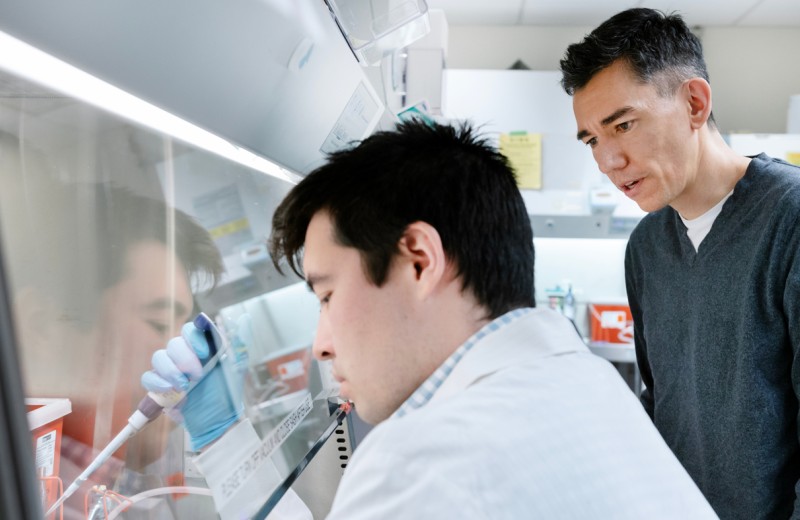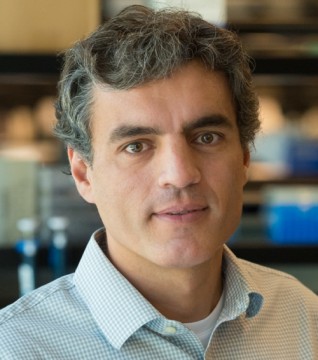Gladstone welcomes inquiries from journalists. Our media relations staff is on hand to provide local, regional, national, and international journalists with accurate information about Gladstone’s research and our investigators’ areas of expertise. We are available to arrange interviews with Gladstone scientists and assist in developing story ideas.
Contact
For media inquiries or interview requests, email media-relations@gladstone.org
Kelly Quigley
Director, Science Communications & Media Relations
Direct line: 858-997-9462
Email
Julie Langelier
Associate Director, Communications
Direct line: 415-734-5000
Email
News Releases
31 - 45 of 218 Results
Scientists Push Single-Molecule DNA Sequencing to the Next Level
Scientists Push Single-Molecule DNA Sequencing to the Next Level
Two new tools created at Gladstone Institutes allow scientists to study DNA at single-molecule resolution using fewer cells than previously required, with clear applications for cancer and many other diseases.
News Release Research (Publication) Cancer Data Science and Biotechnology Ramani Lab Genomics Human GeneticsCRISPR-Based Mapping Uncovers ‘Switches’ for Immune Genes Central to Health
CRISPR-Based Mapping Uncovers ‘Switches’ for Immune Genes Central to Health
A new study in Nature Genetics expands our understanding of immune regulation and autoimmunity—with findings that could also be used in the development of cancer immunotherapies.
News Release Autoimmune Diseases Cancer Genomic Immunology Parker Institute for Cancer Immunotherapy Marson Lab Pollard Lab Ye Lab AI CRISPR/Gene EditingScientists Leverage Machine Learning to Decode Gene Regulation in the Developing Human Brain
Scientists Leverage Machine Learning to Decode Gene Regulation in the Developing Human Brain
A team of researchers from Gladstone Institutes and UC San Francisco combined high-throughput experiments and machine learning to analyze more than 100,000 sequences in human brain cells.
News Release Research (Publication) Data Science and Biotechnology Pollard Lab AI Big Data Developmental Biology Disease Models Genomics Human GeneticsGladstone’s Deepak Srivastava Honored as Most Admired CEO by San Francisco Business Times
Gladstone’s Deepak Srivastava Honored as Most Admired CEO by San Francisco Business Times
The San Francisco Business Times has named Srivastava as one of the Most Admired CEOs among Bay Area businesses and nonprofits. The cardiologist and stem cell pioneer has served in the top leadership role at Gladstone Institutes since 2018.
Awards Institutional News News Release Congenital Heart Disease Cardiovascular Disease Srivastava LabA New Therapeutic Target for Traumatic Brain Injury
A New Therapeutic Target for Traumatic Brain Injury
Research from Gladstone Institutes reveals that a blood coagulation protein is responsible for initiating toxic inflammation and neuron loss after a major head injury. The findings can inform new treatment strategies for a condition that often presents long-term health challenges.
News Release Dementia Traumatic Brain Injury Neurological Disease Akassoglou LabComputational Biology Pioneer Katie Pollard Elected as AAAS Fellow
Computational Biology Pioneer Katie Pollard Elected as AAAS Fellow
The American Association for the Advancement of Science (AAAS), one of the world’s largest general scientific societies, has elected Gladstone Senior Investigator Katie Pollard, PhD, into its new class of AAAS Fellows, a lifetime honor within the scientific community.
Awards News Release Data Science and Biotechnology Pollard Lab AI Big Data Genomics Human Genetics Microbiome$5 Million Grant Bets on Computational Biology, AI to Change the Future of Cancer
$5 Million Grant Bets on Computational Biology, AI to Change the Future of Cancer
The Biswas Family Foundation and Milken Institute announce funding to establish a center for computational cancer biology at Gladstone Institutes, led by Senior Investigator Katie Pollard.
Grants News Release Cancer Biswas Center for Transformative Computational Cancer Biology Data Science and Biotechnology Pollard Lab AI Big DataBarbara Engelhardt Elected Fellow of the International Society for Computational Biology
Barbara Engelhardt Elected Fellow of the International Society for Computational Biology
The ISCB Fellows program is a prestigious recognition within the field of computational biology honoring those who have made outstanding contributions to the discipline. These distinguished scientists and professionals have demonstrated exceptional leadership, research, and service, advancing the frontiers of computational biology and bioinformatics.
Awards News Release Data Science and Biotechnology Engelhardt Lab AI Big DataHeart-to-Heart Connection: Exploratorium and Gladstone Bring a Breakthrough Science Exhibit to Life
Heart-to-Heart Connection: Exploratorium and Gladstone Bring a Breakthrough Science Exhibit to Life
At San Francisco’s Exploratorium, visitors sync their heartbeat with living heart cells; the first-of-its-kind exhibit was created through the museum’s long-running partnership with scientists at Gladstone Institutes.
News Release Stem Cells/iPSCs Conklin Lab Yamanaka Lab Cardiovascular Disease Research (Publication)Scientists Use Cancer’s Strength to Fight Against It
Scientists Use Cancer’s Strength to Fight Against It
In a new study that appears in Nature, researchers leveraged the power of a naturally occurring mutation in cancerous T cells to create a more powerful immunotherapy
News Release Research (Publication) Cancer Genomic Immunology Parker Institute for Cancer Immunotherapy Roybal LabCellular Clean Energy: Can Mitochondria Make More Energy Without Collateral Damage?
Cellular Clean Energy: Can Mitochondria Make More Energy Without Collateral Damage?
New research from Gladstone may help in the development of new therapies that target the problem of cellular energy failure—a hallmark of Parkinson’s, Alzheimer’s, and aging in general
News Release Research (Publication) Alzheimer’s Disease Parkinson’s Disease Neurological Disease Nakamura Lab CRISPR/Gene EditingIn Patients with Long COVID, Immune Cells Don’t Follow the Rules
In Patients with Long COVID, Immune Cells Don’t Follow the Rules
Scientists at Gladstone Institutes and UC San Francisco analyzed immune cells in people with and without long COVID, making significant discoveries that will help answer questions about what causes the condition and how to treat it
News Release Research (Publication) COVID-19 Virology Roan LabUsing Next-Gen CRISPR Tool, Gladstone Scientists Create Unprecedented Molecular Map of Human Immune Response
Using Next-Gen CRISPR Tool, Gladstone Scientists Create Unprecedented Molecular Map of Human Immune Response
The new study from the Marson Lab represents a major stride for human genetics; findings will accelerate the development of new and better therapies for cancer and autoimmune diseases.
News Release Research (Publication) Autoimmune Diseases Cancer Genomic Immunology Marson Lab Basic Science CRISPR/Gene Editing Genomics Human GeneticsA Dynamic Picture of How We Respond to High or Low Oxygen Levels
A Dynamic Picture of How We Respond to High or Low Oxygen Levels
A new study from Gladstone Institutes sheds light on the molecular workings at play when oxygen exceeds normal levels, with findings that may one day inform the decision to use supplemental oxygen as a medical treatment
News Release Research (Publication) Cardiovascular Disease Jain LabGladstone Team Uncovers Why Maternal Diabetes Predisposes Babies to Heart Defects
Gladstone Team Uncovers Why Maternal Diabetes Predisposes Babies to Heart Defects
The cutting-edge research methods that led to the discovery could be used to find other connections between environmental factors and birth defects.
News Release Research (Publication) Cardiovascular Disease Srivastava Lab





















































